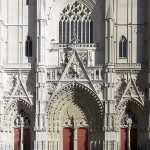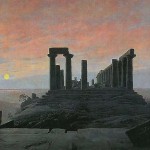My good friends, what is the difference between you and me? Both of us, all of us believe, because we are religious, in the coming of the Messiah. You believe that the Messiah came, went back, and that you are waiting for Him for the second coming. We Jews believe He hasn’t come yet, but He will come. In other words, we are waiting. You for the second coming, we for the first coming. Let’s wait together.” After a pause, he said, “And when He will come, we will ask Him, have you been here before?” Said Buber, “I hope I will be behind Him and I will whisper in His ear, please do not answer.”
From what I’ve read about this anecdote it seems that Buber never said these words, they were invented by Wiesel, but that doesn’t hurt their theological legitimacy. I actually heard them quoted by the Chief Rabbi of Poland during an ecumenical Advent retreat at Auschwitz.
The added twist is that they were most likely invented by Wiesel, whose books, especially Night, were the chief vehicles for promoting the uniqueness of Auschwitz and Jewish suffering, to the exclusion of other victim groups. Groups such as the Polish Catholics represented by St. Maximilian–who were first designated for extermination, long before the camps turned against Jews.
Nearly three million Polish Catholics were killed during the Holocaust, but this is a Forgotten Holocaust (as the sole book on the topic calls it), because the legacy of Auschwitz has become a kind of zero-sum game where one victim group triumphs to the exclusion and forgetting of the others.
Therefore I find it fascinating that Wiesel (along with Francis) provide some new possible ways for understanding the Holocaust as part and parcel of an ongoing history–if only because it reminds us that something like Auschwitz is possible in the near future, rather than being excluded by the better angels of our [postmodern] nature.
Or, as Faulkner paraphrased Pope Francis, avant la lettre, in Requiem for a Nun:
The past is never dead. It’s not even past.
You should also read 5 Facts Holocaust and World War II Remembrances Frequently Forget to learn some things that you should remember.
Consider making a donation to this blog through the donation button on the upper right side of its homepage. Our family just moved to a new place, we’re experiencing car problems, and things will be financially tight until the end of this year. Your donations help keep us, and this blog, going.
Stay in touch! Like Cosmos the in Lost on Facebook:












